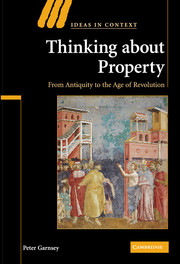Book contents
- Frontmatter
- Contents
- Abbreviations
- Preface
- Introduction
- Chapter 1 Plato's ‘communism’, Aristotle's critique and Proclus' response
- Chapter 2 Plato's ‘communism’: from late antiquity via Islamic Spain to the Renaissance
- Chapter 3 Renunciation and communality: thinking through the primitive Church
- Chapter 4 The poverty of Christ: crises of asceticism from the Pelagians to the Franciscans
- Chapter 5 The state of nature and the origin of private property: Hesiod to William of Ockham
- Chapter 6 The state of nature and the origin of private property: Grotius to Hegel
- Chapter 7 Property as a legal right
- Chapter 8 Property as a human right
- Conclusion
- Bibliography
- Index
Chapter 4 - The poverty of Christ: crises of asceticism from the Pelagians to the Franciscans
Published online by Cambridge University Press: 22 September 2009
- Frontmatter
- Contents
- Abbreviations
- Preface
- Introduction
- Chapter 1 Plato's ‘communism’, Aristotle's critique and Proclus' response
- Chapter 2 Plato's ‘communism’: from late antiquity via Islamic Spain to the Renaissance
- Chapter 3 Renunciation and communality: thinking through the primitive Church
- Chapter 4 The poverty of Christ: crises of asceticism from the Pelagians to the Franciscans
- Chapter 5 The state of nature and the origin of private property: Hesiod to William of Ockham
- Chapter 6 The state of nature and the origin of private property: Grotius to Hegel
- Chapter 7 Property as a legal right
- Chapter 8 Property as a human right
- Conclusion
- Bibliography
- Index
Summary
INTRODUCTION
On 7 May 1318 four men were burned at the stake in the market place of the city of Marseille. According to a contemporary writer:
They were burned because they asserted that the rule of Saint Francis was the same as Christ's Gospel, that, once solemnly promised, it enters the category of precept in the same way that the vow has the force of a precept … It is thus beyond anyone's power of dispensation. They also asserted that the Supreme Pontiff could not concede cellars, granaries and storage facilities for oil to the Brothers Minor, who had promised to observe Christ's Gospel, and that the Pope had sinned in conceding such things, as had the brothers in accepting them.
The four victims are only names to us; the writer was Angelo Clareno, a member of the Franciscan order, Fratres Minores, or Brothers Minor. In protest at what he saw as laxity and corruption in the Order, Clareno tried to form a breakaway group more in tune with the ideals of St Francis. He won temporary success, when Pope Celestine IV created for them a new Order called the Poor Hermits of Pope Celestine, under his own rather than Franciscan jurisdiction. However, Celestine was forced out of office after only four months (in 1294), his acts were nullified by the new Pope, Boniface VIII, and the Poor Hermits fled to Greece (in the first instance).
- Type
- Chapter
- Information
- Thinking about PropertyFrom Antiquity to the Age of Revolution, pp. 84 - 106Publisher: Cambridge University PressPrint publication year: 2007

